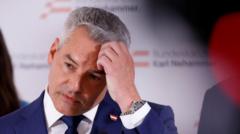Karl Nehammer, Austria’s Chancellor, is set to resign as coalition talks collapse, leaving the future political direction uncertain.
Chancellor Nehammer to Resign Following Coalition Talks Breakdown

Chancellor Nehammer to Resign Following Coalition Talks Breakdown
Austria's political landscape faces uncertainty as coalition negotiations fail.
In the wake of failed coalition negotiations, Austria's Chancellor Karl Nehammer has announced his upcoming resignation, effective within days. Nehammer, who also leads the conservative People's Party (ÖVP), cited an inability to reach consensus with the Social Democrats and the liberal Neos, who withdrew from discussions last Friday.
The recent general election saw a significant victory for the far-right Freedom Party (FPÖ), with its leader Herbert Kickl calling for a coalition with the conservatives. However, other parties have distanced themselves from this possibility, leading analysts to speculate about future negotiations or the possibility of new elections.
The FPÖ's popularity appears to be rising since the election, where they garnered nearly 29% of the vote, while the ÖVP followed closely with 26.3%. The Social Democrats secured 21%. The election turnout of 77.3% highlighted voters' concerns over migration, asylum policies, economic struggles, and the ongoing conflict in Ukraine.
Kickl has championed the idea of a "Fortress Austria," advocating for stricter immigration reforms and suggesting the controversial concept of remigration. The FPÖ, founded in the 1950s by former Nazis, has previously faced scandals, including recent controversy surrounding a candidate's ties to an SS song. Despite these challenges, the FPÖ remains resolved to leverage the chaos in the current political climate to their advantage, calling for the resignation of Social Democrat leader Andreas Babler and attributing blame to President Alexander Van der Bellen for the ongoing instability.






















